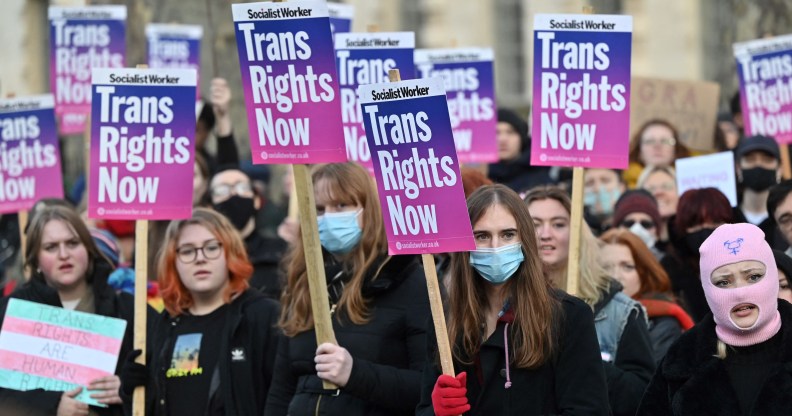UK Parliament hosts first all-trans panel on the experience of trans+ children in school

The panel was held in the wake of the draft guidance for supporting trans children in school. (JUSTIN TALLIS/AFP via Getty Images)
The UK Parliament has hosted its first all-trans panel, where experts spoke to politicians on the experience faced by trans, non-binary and questioning children in schools.
MPs Kate Osborne and Caroline Nokes held the panel on 6 February, where experts discussed the challenges faced by teachers, schools and parents to keep trans and gender-diverse children safe and happy whilst in education.
Trans children are more likely to be bullied and less likely to have close friends in school compared to their peers, as per a 2021 report from the charity Just Like Us. This has led to several children being removed from mainstream education and home-schooled instead.
The event was held in response to the UK Government’s draft guidance for schools and colleges about how to support trans, non-binary and gender-fluid pupils.
However, the draft guidance positions the existence of trans people as an “ideology” — a phrase often invoked by anti-trans figures to slow division between groups.
It also suggests that teachers and school staff can “decline” a request by a trans pupil to use the pronouns they identify with, as well as urging that staff take a “cautious approach” for students who are socially transitioning. This is where someone might choose to change their name, pronouns or the clothes they wear.
The guidance further suggests that schools do not need to allow socially transitioning pupils access to single-sex spaces in their identifying gender, like toilets, showers and changing rooms.
Now, the panel notes that “many in the LGBTQIA+ community and the education sector fear will make supporting trans and gender questioning children to thrive and learn at school all but impossible”.
Legal experts on the panel also questioned whether the draft guidance is lawful.
The MPs, Lords and staff who attended the event said it was “distressing” to hear directly from young trans people who continue to be failed by the education system, as well as those who have been campaigning for trans rights for decades.
The panellists also offered “hope” in the wake of the guidance, sharing their vision of a “compassionate, common sense education that treats trans children with the care and respect they deserve, freeing them to concentrate on learning”.
Osborne said at the panel: “Some MPs are using vile discriminatory language and too many MPs have a complete lack of understanding of the impact of legislation or even of how to help their trans constituents.”
Nokes added: “Politicians need to stop using hugely problematic anti-trans language and realise the damage they are doing to some of the most vulnerable in society.”
Jude Guaitamacchi, director of the Trans+ Solidarity Alliance, said: “Trans solidarity is needed in the UK more than ever. There is an urgent need to support the trans community, particularly in UK schools.”
They continued: “We brought together a panel of trans experts in the fields of law, and education and invited a trans youth advocate to speak about his own experiences. So many discussions about us are being had without us. It’s time for trans people to be part of the conversation and for our voices to be heard instead of being ignored, talked over and spoken for.”

